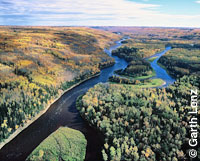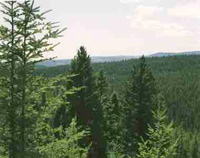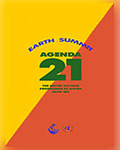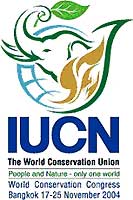
International Forest Policies
A Short History of Global Forest Policy1992 Rio Earth Summit - Statement of Forest Principles In the late 1980s and early 1990s, there was a growing global concern about the state of the world's forests and the alarming rates of deforestation in some countries. In 1992, heads of State met at the United Nations Conference on Environment and Development (UNCED), also known as the "Earth Summit", in Rio de Janeiro.
In the late 1980s and early 1990s, there was a growing global concern about the state of the world's forests and the alarming rates of deforestation in some countries. In 1992, heads of State met at the United Nations Conference on Environment and Development (UNCED), also known as the "Earth Summit", in Rio de Janeiro. View the Rio Declaration on Environment and Development High on the agenda at the Rio Earth Summit was the issue of forests and deforestation. However, there was controversy; polarization between developing and developed countries made for intense negotiations among governments. The objective of a legally binding instrument on forests similar to conventions on climate change, biological diversity and desertification was not met and instead the meetings resulted in the Non-legally Binding Authoritative Statement of Principles for a Global Consensus on the Management, Conservation and Sustainable Development of all Types of Forests. This document is also known as the "Forest Principles", as well as Chapter 11 of Agenda 21: Combating Deforestation. It was the first global consensus on forests, and deals with the needs of people who want to protect forests for environmental and cultural reasons and with the needs of people who use trees and other forest life for economic development. Sources: UN Forum on Forests,
IISD Earth Summit Resources - Forest Principles, UN Forum on Forests Fact Sheet (PDF) The rio statement says that forests, with their complex ecological processes, are essential to economic development and the maintenance of all forms of life. They are the source of wood, food and medicine, and are rich storehouses of many biological products yet to be discovered. They act as reservoirs for water and for carbon, that would otherwise get into the atmosphere and act as a greenhouse gas. Forests are home to many species of wildlife and, with their peaceful greenery and sense of history, fulfill human cultural and spiritual needs. View the 1992 Rio Summit Forest Principles UN Forest Bodies  Significant progress has been made since the United Nations Conference on Environment and Development (UNCED). Through the 1990s, the main focus within the United Nations was the development of coherent policies to promote the management, conservation and sustainable development of all types of forests. The main intergovernmental forums for international forest policy development were the Intergovernmental Panel on Forests (IPF) (1995-1997), and the Intergovernmental Forum on Forests (IFF) (1997-2000), both under the auspices of the United Nations Commission on Sustainable Development. An informal, high level Interagency Task Force on Forests (ITFF) was set up in July 1995 to coordinate the inputs of international organizations to the forest policy process. Significant progress has been made since the United Nations Conference on Environment and Development (UNCED). Through the 1990s, the main focus within the United Nations was the development of coherent policies to promote the management, conservation and sustainable development of all types of forests. The main intergovernmental forums for international forest policy development were the Intergovernmental Panel on Forests (IPF) (1995-1997), and the Intergovernmental Forum on Forests (IFF) (1997-2000), both under the auspices of the United Nations Commission on Sustainable Development. An informal, high level Interagency Task Force on Forests (ITFF) was set up in July 1995 to coordinate the inputs of international organizations to the forest policy process. The most important outcomes of the deliberations under the IPF and IFF processes are presented in the final reports of these processes, IPF4 and IFF4, which are considered collectively as the IPF/IFF Proposals for Action. The IPF/IFF proposals for action are not legally binding, however participants of these processes are under political obligation to implement the agreed proposals for action and each country is expected to conduct a systematic national assessment of the IPF/IFF proposals for action and to plan for their implementation. Source: UN Forum on Forests
United Nations Forum on Forests (UNFF)  The United Nations Forum on Forests (UNFF) was established by the UN Economic and Social Council (ECOSOC) Resolution/2000/35 in October 2000 as part of the new international arrangement on forests to continue and build on the IPF and IFF processes. The United Nations Forum on Forests (UNFF) was established by the UN Economic and Social Council (ECOSOC) Resolution/2000/35 in October 2000 as part of the new international arrangement on forests to continue and build on the IPF and IFF processes.The UNFF is a subsidiary body with the main objective to promote "...the management, conservation and sustainable development of all types of forests and to strengthen long-term political commitment to this end..." based on the Rio Declaration, the Forest Principles, Chapter 11 of Agenda 21 and the outcome of the IPF/IFF Processes and other key milestones of international forest policy. The UNFF1 Report outlines the UNFF Plan of Action and Multi-Year Programme of Work (MYPOW). The UNFF further feeds into broader global environment and development processes with documents such as the UNFF2 Ministerial Declaration to the World Summit on Sustainable Development.  Download the UNFF Plan of Action (PDF) Download the UNFF Plan of Action (PDF)View information on UNFF Multi-Year Programme of Work View UNFF reports UNFF-6 took place in New York, February 13-24th, 2006. According to the press release issued by the UNFF at the close of the 2006 meetings, the UNFF reached agreement on Four Global Objectives on Forests:
 Download UNFF press release issued at the close of UNFF-6 (PDF) Download UNFF press release issued at the close of UNFF-6 (PDF) The International Institute for Sustainable Development (IISD) produces the Earth Negotiations Bulletin (ENB) - an independent reporting service that provides daily information in print and electronic formats from multilateral negotiations on environment and development. ENB covered UNFF-6 and produced daily highlights from the meetings. ENB also published an overall summary of UNFF-6.
The International Institute for Sustainable Development (IISD) produces the Earth Negotiations Bulletin (ENB) - an independent reporting service that provides daily information in print and electronic formats from multilateral negotiations on environment and development. ENB covered UNFF-6 and produced daily highlights from the meetings. ENB also published an overall summary of UNFF-6.According to the ENB UNFF-6 summary, UNFF-6 set out to complete unfinished business from UNFF-5 and negotiate an ECOSOC resolution on the future of the international arrangement on forests. Many previously intractable country positions were bridged in the final days of negotiation, and delegates worked hard to finalize a resolution. However, considering that most substantive issues on an instrument for all types of forests remain undecided and much language in the resolution substantially watered down, the seemingly successful outcome of the meeting has had a mixed reception. What remains apparent is that the sense of urgency that brought the forests issue into the mainstream of international environmental politics is no longer present within the UNFF. Pursuit of consensus on forest issues at the highest level has produced a document limited by the lowest common denominator...
In the end, an 11th-hour effort secured the next step in the IAF- a process to develop a voluntary instrument. But how far will this take us in the face of factors detracting from this process, including countries in pursuit of an LBI, the fragmentation of international forest policy, and the lack of civil society engagement? In addition, as one delegate from a developed country noted, the voluntary subscription envisaged for the instrument weakens its status considerably. View the IISD Earth Negotiations Bulletin (ENB) coverage of UNFF-6 View the ENB Summary of UNFF-6 International Forest Bodies Agenda 21 is a global action plan for sustainable development for the 21st century agreed to by world leaders from over 100 countries of the world at the 1992 United Nations Conference on Environment and Development (UNCED) (the Earth Summit) in Rio de Janeiro. Agenda 21 is a global action plan for sustainable development for the 21st century agreed to by world leaders from over 100 countries of the world at the 1992 United Nations Conference on Environment and Development (UNCED) (the Earth Summit) in Rio de Janeiro.The purpose of Agenda 21 is to attempt to address the social, environmental, and economic implications of development through strategies and program measures that countries can implement to promote the sustained and responsible development of the planet. It lays out what needs to be done to reduce wasteful and inefficient consumption patterns in some parts of the world while encouraging increased but sustainable development in others. Agenda 21 calls on governments to adopt national strategies for sustainable development, which should be developed with wide participation, including non-government organizations and the public. Sources: Government of Canada SDinfo - Agenda 21, IISD Earth Summit Resources - Agenda 21
View the text of Agenda 21 Section 2, Chapter 11 of Agenda 21 is entitled Combating Deforestation. It deals with the following topics:
The Montréal Process (1993) The 1992 United Nations Conference on Environment and Development (UNCED) in Rio de Janeiro, was the impetus to launch an initiative to improve understanding and measure progress toward sustainable forest management because of the principles for sustainable forest management that were agreed to at the meeting. In September 1993, the Conference on Security and Cooperation in Europe (CSCE) sponsored an international seminar in Montréal, Canada, on the sustainable development of boreal and temperate forests, with a focus on developing criteria and indicators for the assessment of these forests. After the seminar, Canada drew together countries from North and South America, Asia and the Pacific Rim to develop criteria and indicators (C&I) for non-tropical forests and, in June 1994, the initiative now known as the Montréal Process began. |
|
| Of all the C&I initiatives, the Montréal Process is geographically the largest, encompassing most of the world's temperate and boreal forests. Twelve countries on five continents are involved in the Montréal Process; participating countries account for 90% of the world's temperate and boreal forests and 60% of the world's forests overall. Visit the Montréal Process web site The Montréal Process C&I are intended to be applied to all the forests of a country, at the national level, across all types of land ownership. Each participating country has made a commitment to work toward the sustainable management of all of its forests through endorsing the Montréal Process C&I. |
Montréal Process Criteria
|
World Commission on Forests and Sustainable Development  Following the 1992 Rio Earth Summit, and the recognition that solutions to forest degradation are likely to be more political than technical, the InterAction Council, a group of some 30 former heads of Government and State, decided to establish an independent commission - the World Commission on Forests and Sustainable Development (WCFSD). Following the 1992 Rio Earth Summit, and the recognition that solutions to forest degradation are likely to be more political than technical, the InterAction Council, a group of some 30 former heads of Government and State, decided to establish an independent commission - the World Commission on Forests and Sustainable Development (WCFSD).The objectives of the WCFSD were to:
|
|
| In a series of global regional hearings held in 1996 and 1997, the WCFSD provided a forum for forest stakeholder groups to take part in open policy dialogue on issues of local and global concern. The goal was to "seek to achieve policy reforms aimed at reconciling economic and environmental objectives for sustainable management of global forests." Winnipeg was the site of the North American WCFSD hearings, September 30 - October 2, 1996, hosted by the International Institute for Sustainable Development. The Commission released its Final Report, Our Forests Our Future, in Washington, USA April 19, 1999. The report proposes a plan for how the world's forests can be used without being abused, and outlines what it takes in terms of policies and institutions for such a plan to be implemented. The attention to North America's boreal forest regions from the WCFSD commissioners, especially by listening to and visiting First Nation and Aboriginal communities in Canada's boreal regions, provided one of the first focus on the importance of boreal regions.  Download a Summary report of the WCFSD Final Report (PDF) Download a Summary report of the WCFSD Final Report (PDF)Source: IISD - WCFSD |
Ten recommendations from Our Forests Our Future:
|
3rd World Conservation Congress - Boreal Forest Resolution  The 3rd IUCN World Conservation Congress took place in Bangkok, Thailand in November 2004. The 3rd IUCN World Conservation Congress took place in Bangkok, Thailand in November 2004. Amongst the many recommendations that were adopted by the 3rd WCC was CGR3.REC021 - Conservation of Canada's Boreal Forest. The recommendation calls on Canada, Russia, and all boreal forest nations to recognize, preserve and protect ecological processes that sustain the overall health of boreal forest regions. The recommendation is also of particular significance for Manitoba as it makes explicit reference to the First Nation led World Heritage Site nomination that spans the east side of Manitoba and the western part of Ontario. (See Manitoba Wildlands' World Heritage Site section for more information). The recommendation refers to the need to "facilitate and continue to fund needed scientific, technical, indigenous and local community activity to assist in the nomination and designation of boreal forest regions as recognized international sites, for example, World Heritage Sites such as the indigenous led Atikaki/Woodland Caribou/Accord First Nations - Manitoba and Ontario nomination, recently placed on Canada's official Tentative List for World Heritage Sites."  Download WCC Recommendation CGR3.REC021 - Conservation of Canada's Boreal Forest (DOC) Download WCC Recommendation CGR3.REC021 - Conservation of Canada's Boreal Forest (DOC)Visit IUCN Forest Programme site View IUCN International Forest Policy  Download IUCN/WWF Forests for Life Policy (PDF) Download IUCN/WWF Forests for Life Policy (PDF) |
|
International Forest Initiatives
Canada's International Commitments
 2002-2014
2002-2014

